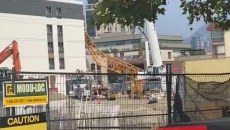More than eighty years ago, Japanese Canadians came together to sustain The New Canadian, the only newspaper specifically for the community that was allowed to be published through the Second World War.
Now the community has come together again — and may have saved the newspaper's archives from the digital scrap heap.
Supporters say the newspaper that published from 1938 to 2001 was a pillar of the community during the turmoil of the war when Japanese Canadians were interred, stripped of assets and had their patriotism questioned.
The New Canadian's digital archives had been facing deletion, after Simon Fraser University Library announced recently it would no longer host them on its servers from this fall.
But after the announcement sparked outcry — and more than 3,000 people signed an online petition calling for the archive to be saved — SFU said in a statement on Monday that it recognized the importance of preserving access to sources including The New Canadian, and it would continue to host the archive until an accessible online alternative is found.
Poet and playwright Carolyn Nakagawa, who was among the petition's signatories, said she was thrilled by SFU Library's announcement.
"I feel really happy. I'm so pleased that SFU responded to the communities speaking out about this, and they heard what we had to say," said Nakagawa, who lives in Coquitlam, B.C.
"I am really proud. I want to say thank you … and to everyone who signed it and added their own words about why it was important."
Seventy-eight-year-old Alan Itakura from Montreal, Quebec, also signed the petition and said he was "quite astounded“ by how quickly the archive was thrown a lifeline.
”I am sure everybody that signed the petition is very happy that the result is positive," said Itakura, who was born in an internment camp in 1945 in Kaslo, B.C., after the end of the Second World War. "The good news is that the archives are alive and well and accessible, which is the most important thing."
Other Japanese -language newspapers were shut down after the outbreak of war. More than 22,000 Japanese Canadians in B.C. were ordered detained and sent to internment and work camps far from the coast.
Itakura recalled being featured in the newspaper 65 years ago when he won a judo tournament at the age of 13. He said his mother clipped out the article and kept it in a scrapbook.
He said The New Canadian, which published in both English and Japanese and was initially based in Vancouver, was a "must-read" newspaper for his family.
"When I went to Japan and lived there for a couple of years post-university, (my mother) would send me clips of articles from The New Canadian just to keep me up to date with what was happening back home," said Itakura.
SFU Library had listed The New Canadian among more than two dozen newspapers whose digital archives would no longer be hosted, saying that access to physical copies would have to be arranged with the Multicultural History Society of Ontario.
The library had said it was migrating its digital collections to a new website this year and as part of that process it had been reviewing which publications would be retained and which ones would be removed.
But in an emailed response on Monday, SFU Library said it would continue to host The New Canadian until an accessible online alternative is found.
Nakagawa said the support for the petition reflected the devotion that the "Nisei" community — second-generation Japanese Canadians — had felt towards The New Canadian in the past.
Nakagawa said that when reading articles about Japanese Canadians written more than 80 years ago, “their voices are so alive."
“(You) get to see their personalities and their hopes and their dreams, and it doesn't feel like history anymore. It feels like the present. It feels like people that you know,” said Nakagawa.
After Japan’s attack on Pearl Harbour on Dec. 7, 1941, the newspaper published a front-page editorial affirming the Nisei community's "complete unswerving loyalty to Canada."
"Indeed the war has not lessened our contribution as a group to the Canadian nation; it has imposed upon us a greater task for the future," its editors wrote on Dec. 12, 1941.
On the same page, the paper carried a brief story noting that naturalized Japanese Canadians would have to report to "the registrar of enemy aliens."
In the months before the war, a columnist had rallied readers to subscribe and keep the newspaper in print, telling them "you know in your hearts that The New Canadian is worth every Nisei's helping hand."
Petition starter Larissa Kondo from Langley, B.C., said she was struck by the newspaper advertising buying war bonds as "an investment in freedom" during the war era, at a time when many of The New Canadian's readers were in internment camps.
"And I'm thinking, what kind of mental gymnastics are required to advertise that buying war bonds equals freedom in a paper targeted to incarcerated people," said Kondo.
She said the paper's wartime stories that spoke to her included one in which Japanese Canadians were told to surrender their pets before they had to leave their homes for internment.
“So, it's the only (newspaper) that offers that first-person perspective on what it was like to be forced from your home, to have your family split up, to have your possessions sold, to be incarcerated indefinitely,” said Kondo.
"And so I think that that's another thing that The New Canadian is really valuable for. It is a good resource for learning about what happened to us so that hopefully it doesn't happen to anyone else ever again," Kondo said.






